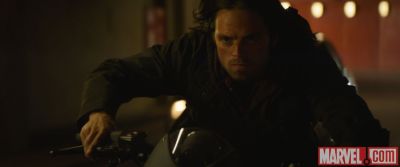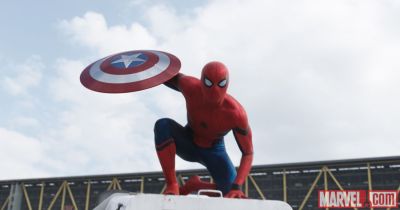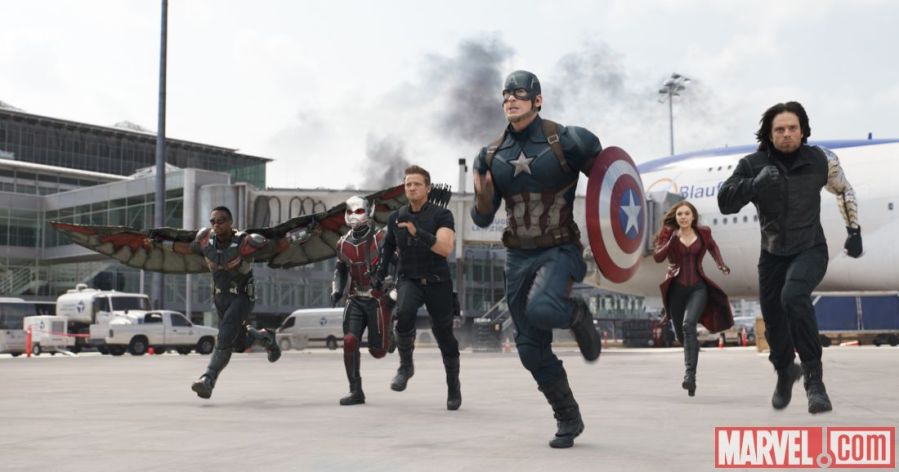I’m back! My apologies for the long hiatus — five classes made it a bit difficult to even go see new movies, let alone write about them. But, blessedly, Captain America: Civil War came out right near the end of the semester, so I was able to go see it last week. And like any good Marvel fan, I have some opinions.
First, let me address what it did well. For a blockbuster superhero flick, the plot is solid. The Russo brothers wisely tied regulation instead to the increasing vigilante acts of the past several films and their human cost. It’s a thoughtful, human take on the unseen casualties of the fight-as-spectacle that features in so many big-budget action movies, and seeing how the awareness of these tolls affects the heroes themselves serves us to empathize with both sides of the fight. We may not agree with Tony Stark/Iron Man (Robert Downney, Jr.), but we understand that his position is born out of his guilt for his role in creating Ultron.
However, the real heart of the film is Steve Rogers’/Captain America’s (Chris Evans) journey to rescue and reconnect with his childhood friend, Bucky Barnes/Winter Soldier (Sebastian Stan), even when it pits them against the government. Using Barnes as the central conflict ties Civil War nicely to its predecessor and gives the Rogers/Barnes friendship some much-needed development, as well as providing a compelling motivation for Tony’s rage in the form of his suppressed grief over his personal relationship with Barnes’ past crimes as an assassin.

Surrounded by a slew of heroic ensembles — Batman v Superman came out on March 26th, and X-Men’s staggeringly crowded Apocalypse is slated for later this month— Civil War also stands out for its deft handling of a large cast. We get solid characterizations for Wanda Maximoff/Scarlet Witch (Elizabeth Olsen), Sam Wilson/Falcon (Anthony Mackie), Vision (Paul Bettany), all of whom were established in previous films but hadn’t yet had time to develop. The hints of romance between Maxmimoff and Vision are a sweet reprieve from their teammates’ drama, and Wilson establishes himself as a witty, adept Avenger.
Newcomer T’Challa/Black Panther (Chadwick Boseman) is scene-stealing, his regal bearing and strong moral compass an outsider’s response to the antics of a team that’s been working together for years. And his ascendency to the Black Panther role in a quest for revenge over his father’s death is an interesting foil to both Stark’s for the murder of his parents and villain Zemo’s (Daniel Bruhl) seething anger over the loss of his entire family. Using revenge as a prime motivation thrice over is a bit heavy-handed, but the film manages to explore three separate paths and the emotional costs of each’s approach.

Moreover, the Russo brothers once again demonstrate their considerable skill at choreographing fight scenes. (As an aside, don’t dismiss the importance of fight choreography. Lest we remember just how bad it can be, apologies to HBO…) It seems like it’d be difficult to follow their elevator scene from TWS, but the two teams’ clash in the much-teased airport scene may be a worthy successor. Though limited to this scene only, Scott Lang/Ant-Man (Paul Rudd) shows off his brand of physical comedy with some new size-based powers, while Peter Park/Spider-Man (Tom Holland) is a stuttering, awestruck, out of his depth webslinger, for once painting Spider-Man as the nerdy teen of his comics incarnations.
All that said, the film is deeply flawed. Though the large cast is eye-catching in action, it’s a distraction. This is a Captain America film in name, but the storyline featuring him and Barnes is lost under the flash and bang of the ensemble. Rumor has it that the original script was a journey of self-discovery for our poor brainwashed ex-assassin, and moments of that script shine through, but they deserved more. This film reads like an Avengers film, when it’s not and shouldn’t be. Moreover, in its efforts to keep so many moving pieces in the air—the government as an overpowering entity! Zemo’s dead wife! Stark’s parents and Barnes’ past crimes!—some of them are fumbled. Zemo’s motivations follow from AoU‘s climactic Sokovia battle and reflect the other side of Stark’s guilt over having become once again a merchant of death, but Zemo himself has so little screen time that his character is nearly completely flat. His overarching goal of using Barnes to drive a wedge between Stark and Rogers is unnecessarily complicated. Who knows? And, honestly, who cares.

Addressing this film’s failures would be incomplete without touching on its greatest mistake: forcing an uncomfortable romance between Sharon Carter/Agent 13 (Emily Vancamp) and Rogers. Introduced briefly as a competent SHIELD agent in TWS, she’s brought back only to establish her as an ally, and then a love interest. Putting aside the unnecessary heterosexuality forced on both Rogers and Barnes for no reason other than to head off the otherwise inevitable pairing (see my previous commentary here), it’s just gross. Their romantic moments come mere hours or days after Rogers buried her aunt Peggy Carter, the first women he’d ever loved. It pawns Rogers’ affections off as desperate, and uses her a replacement. Following the disastrous Bruce Banner/Hulk (Mark Ruffalo) and Natasha Romanoff/Black Widow (Scarlett Johansson) subplot in AoU, it’s disappointing that Marvel went this direction once again.
But did I enjoy it? Was it fun? Would I go see it again? A resounding “yes” to all three. It’s hard not to let out a cheeky grin at Peter Parker talking tech with Tony Stark, or at Ant-Man’s snarky commentary while he clambers around in the Iron Man suit. The entire cast seems to have finally learned humor, the forced one-liners of AoU replaced by well-timed clever remarks. (Wilson and Barnes as belligerent road-trip buddies—sign me up for that film.) The reluctantly respectful relationship between T’Challa and Barnes, too, is a wonderful teaser for the upcoming Black Panther movie. And the complicated resolution for both Stark and Rogers, neither of whom walk out with what they’d staked their lives to fight for, but find themselves unmoored from their former anchors, is an appropriately melancholy prize for their shared stubbornness. But between this film’s paring-down of the Barnes/Rogers dynamic and the mid-credits scene, which offers an unsatisfying and, in my opinion, pretty out-of-character close to his own arc for the time being, it left me wanting more.


I want to see Civil War so badly!! I loved the review!
LikeLike